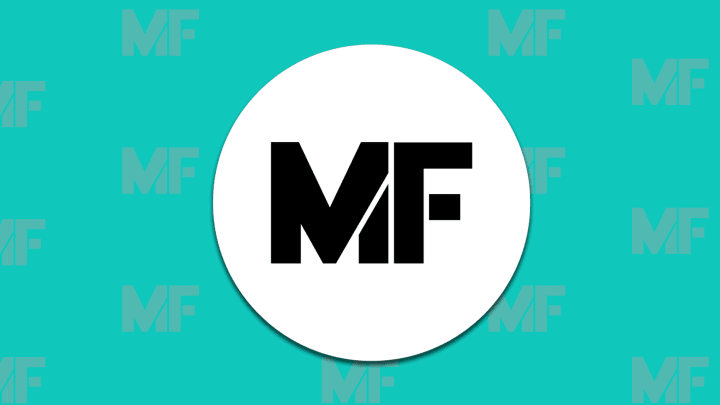Today is Roald Dahl Day, on which Dahl-ites everywhere celebrate the beloved author of James and the Giant Peach, The Fantastic Mr. Fox, and Charlie and the Chocolate Factory. While the former fighter pilot reportedly hated the 1971 movie version of perhaps his most famous book, we can’t help but love it and the wonderful words it gave us. Here are 11 especially Wonka-tastic words from the film and the stories behind them.
1. OOMPA-LOOMPA
Oompa-Loompa, doopetee doo! We’ve got some wordy origins for you.
Oompa-Loompa is an example of reduplication, the repeating of syllables for a whimsical effect. While loompa is probably nonsensical, oompa might come from oompah, the sound of a brass instrument or a band of such instruments.
In the 1920s, "oompah, oompah, stick it up your jumper!" was a popular saying expressing contempt, defiance, or dismissal.
2. GOLDEN TICKET
Mysterious candy maven Willy Wonka has hidden five golden tickets in chocolate bars all over the world, and whoever is lucky enough to find one has the chance for a lifetime supply of chocolate and—we find out later—much, much more.
Now, the term golden ticket can refer to any lucky break. The phrase plays off meal ticket, something that ensures prosperity and financial security, and which originally referred to a literal ticket for a cheap meal.
As for when exactly golden ticket originated, that’s as mysterious as Wonka himself. According to Google Ngrams, the term peaked in usage in the 1840s, although at that time it seemed to refer to a ticket for special entrance into performances and other venues.
While usage of the phrase dropped off after the 19th century, it began to rise again after the mid-1980s, perhaps around the time that Willy Wonka began running on cable television.
3. EVERLASTING GOBSTOPPER
Old Slugworth would give his right thumb for an everlasting gobstopper. The infinite candy could “revolutionize the industry,” says Wonka. “You can suck 'em and suck 'em and suck 'em, and they'll never get any smaller.”
In the 1970s, Breaker Confections, a Chicago candy company bought by Nestle in the 1980s and renamed the Willy Wonka Candy Factory, put out an everlasting gobstopper as a movie tie-in. Alas, their version bears no resemblance to the Sputnik-shaped jawbreaker in the film.
A real-life long-lasting sucker is the Japanese 60-Minute Candy, which is aimed to stop dieters from snacking and was originally made for fishermen who needed hands-free refreshments.
As for the word gobstopper, it originated in the late 1920s. Slang for “mouth,” gob either comes from the Irish gob, “beak,” or might be a corruption of gab. The term jawbreaker is older, from about 1875, and was a British brand name for a kind of gobstopper, and before that, referred to a word that’s hard to pronounce. As for usage, jawbreaker wins that popularity contest.
4. SNOZZBERRY
“Snozzberries?” Veruca says. “Who ever heard of a snozzberry?”
While on the surface snozzberries may seem merely a fantastical fruit joining the ranks of the oranges, pineapples, and strawberries on Wonka’s lickable wallpaper, the term might actually be a (very dirty) inside joke.
According to Cracked, in a 1979 adult novel, Dahl uses snozzberry to refer to a penis. When asked how she got a man to wear a condom, a character answers, "I grabbed hold of his snozzberry and hung onto it like grim death and gave it a twist or two to make him hold still." All of which makes the idea of kids licking snozzberry wallpaper super-creepy.
The construction of the word itself screams male genitalia. Snozz could be an alternation of the phallic schnozz, or nose, while berries could refer to testicles (see twig and berries).
5., 6., 7., 8. WHANGDOODLES, HORNSWOGGLERS, SNOZZWANGERS, AND VERMICIOUS KNIDS
Dahl was obviously a master at creating nonsensical words, but he didn’t make up all of the names of the monsters that the poor Oompa-Loompas had to deal with.
Whangdoodle originated around 1858 to mean an imaginary creature or unnamed thing (think whatsit or watchamacallit) while hornswoggle, to dupe or bamboozle, is from 1829. Vermicious means “pertaining to worms.”
The only Dahl-originals appear to be snozzwanger and knid. Outside of Dahl, we couldn’t find anything on knid (besides the inevitably-named indie rock band) while snozzwanger might be a blend of schnozz and wang, slang for “penis,” which seems to be a recurring theme for Dahl.
9. SCRUMDIDDLYUMPTIOUS
Scrumdiddlyumptious is a delicious portmanteau combining scrumptious and diddly. While we now use scrumptious to refer to something yummy, the word also at one time meant fastidious and hard to please. This meaning comes from scrump, an alteration of scrimp, to scrape and save. Before scrumptious came to refer specifically to tasty food, it was enthusiastic praise for anything.
Diddly, meaning something insignificant or trifling, either comes from diddle, to waste time, or tiddly, a tiny amount.
10. EGGDICATOR
A blend of egg and indicator, the eggdicator “can tell the difference between a good egg and a bad egg,” says Wonka.
11. VERUCA SALT
Dahl certainly gives Charles Dickens a run for his money in terms of making up names. While Mike Teavee is a bit obvious (the kid watches a lot of TV), Violet Beauregard perfectly captures the pseudo-elitism of new money Americans; Charlie Bucket, a plain modesty; and Augustus Gloop, the sound of a full belly.
However, the most subtle jibe might be Veruca Salt. A verruca is a kind of wart, and while salt is clearly a nod to Mr. Salt’s nut business, it also refers to wit or sarcasm, something sharp or bitter, and sexual desire.
A fan theory suggests that each child represents a deadly sin. Along that vein, Veruca might be lust (although she's lusty for material items, not sex); Augustus, gluttony; couch potato Mike, sloth; and poverty-stricken Charlie, envy. However, there are more sins than kids and some, like Violet and Veruca, could embody more than one. Regardless, knowing all of that makes the band name Veruca Salt even saltier.
